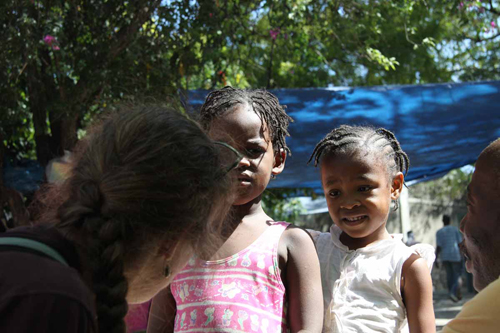Pieces of normal

Oxfam America’s Coco McCabe is one of several Boston-based colleagues in Haiti to help with the relief effort. Here’s her latest update, dated January 30; this blog is part one of a two-part series.
Buildings lie in heaps. Rubble blocks the roads. Streets serve as beds at night. But still, people here in Port-au-Prince are reclaiming bits and pieces of the old normal.
At a car wash, men hose the dust off their SUVs, delighting in the glimmer of the enamel beneath, some of it bashed by falling concrete. Nearby, I see a man bent over the spikes in an iron fence holding a paintbrush. He’s carefully touching up the nicks in the bright blue paint that dresses them up. Dust and chunks of collapsed buildings stretch along both sides of the street, but I get the feeling he sees only the strokes he applies, and finds relief in making his fence perfect.
With bravado, a shopkeeper has hauled his stock of upholstered chairs, vacuum cleaners, and toilet bowls out to the road’s edge in front of his store. Forget what’s happened, seems to be his message—as if people still had homes for these goods.
And a pair of teenagers—the girl about six inches taller than the boy–experiment with holding hands as they walk back and forth through the camp that’s now their home, blind to the tents and sheet shelters where parents, brothers and sisters, aunts and uncles, cousins and friends all crowd together for sleep at night.
In just seconds on Jan. 12, the world as Port-au-Prince had known it collapsed. All that had seemed so permanent—the concrete buildings, the stone retaining walls, the cinder block homes lining old alleys—was suddenly, terrifyingly gone.
And while some in Port-au-Prince are able to find ways to feel a bit of normalcy, I wonder about the children and how this disaster may have altered their perspective—and sense of security—forever.
I can’t shake the look on the face a 5-year-old girl who came up to me in a camp and tugged on my pant leg. She was tiny and grave, her brow wrinkled with a worry deeper than any I have ever seen in a child. She wanted to talk, to tell me—a total stranger—what had happened.
My house fell down, she said quietly.